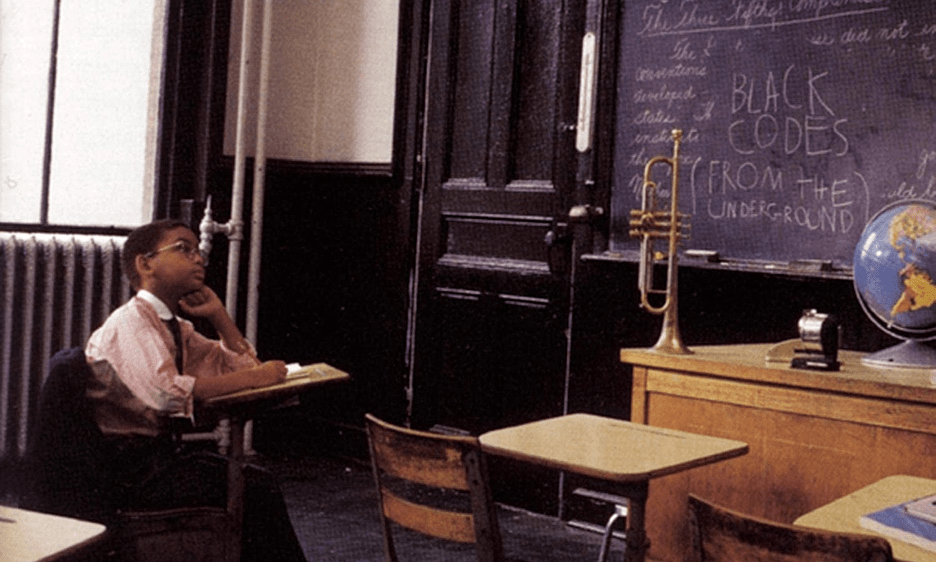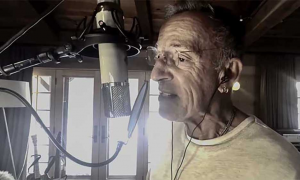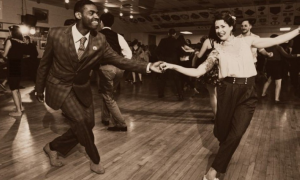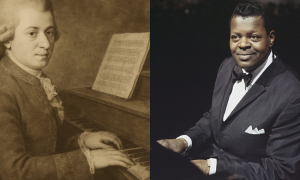Home » Jazz Articles » Opinion » A response to yet another senseless public murder of a B...
A response to yet another senseless public murder of a Black Citizen by officers of the law

It's funny to think this whole experiment in democracy could end with a populace that is so polarized and self-absorbed that it can't imagine atoning for the slavery and subjugation of other human beings and sharing enormous wealth (financial and other) with each other.
I also believe that the everyday tragedies that are commonplace and routine to our everyday way of living, should be addressed when they happen, not when so much pressure has built up in the system that it must be let out. It's also much more difficult to draw a crowd every day for the sanctioned and accepted forms of corruption and disrespect of Black Americans that are shouted from countless recordings and videos and even more powerfully whispered in the form of discriminatory laws, practices and procedures that result in unfair housing and employment practices, and more tragically, lengthy unjust prison sentences.
Much of this "cacophony of crazy" is executed officiously and with a warm and innocuous smile. Therefore, Americans of all hues pass quickly from anger to acceptance, and as months turn to years, our daily silence and inaction is willfully misread as endorsement and back we go to go the illusion that "we're past this," because the daily grind is more important than what we find if we just open our eyes and keep them open.
This particular tragedy, however common it's become across these last decades, is perfectly symbolic of this specific time and place. And this global pandemic has given it a clear and more pungent stage. This murder is so distinctive because of the large size and gentle nature of the man who was murdered, because of the smug, patient and determined demeanor of his killer and of the other peace officers protecting the crime in full public view, and because our nation is always attempting to escape its original sin with the loud shouting of other serious, though less egregious, transgressions. This fully recorded public execution yet again demands our full attention and interest, IF we have the slightest remnant of belief in the morality, reason and intelligence required to realize, maintain and protect a libertarian democracy.
In each of the four decades of my adult life, I have addressed our myriad American social and character problems with an involved piece that always defends a belief in the progression towards freedom that my parents taught us was perhaps possible for all. Experientially, artistically, and spiritually, I've had a lifetime relationship—akin to obsession—with confronting this national calamity and conundrum.
As these decades have passed and our nation has retreated from the promises of the Civil Rights Movement that my generation grew up believing would substantially improve economic and social opportunities for those who had been denied by our 'traditions,' I have spoken, written, played and composed about the toll that American racial injustice has taken on all of us—our possibilities, our presence and our promise. Those words, notes and more seem to have been wasted on gigs, recordings, in classrooms, in prisons, in parks, on tv shows, in print, on radio and from almost any podium from the deep hood to palatial penthouse in cities, towns and suburbs in every state and region of our country day and night and sometimes deep into the night for over 40 relentless years.
Just yesterday, I was walking with my 11-year-old daughter and she asked me, "Did you see the video of the man in Minneapolis?" "Yes" I said. I always talk to her about history and slavery and all kinds of stuff that she is not interested in—and probably overdo it for that reason. She asked, "Why did the man just kneel on him and kill him like that in front of everybody?" Instead of answering I asked her a question back, "If I went out of my way to squash something that was harmless to me, and stomped on it repeatedly and deliberately to make sure I had killed every drop of life in it, and then looked defiantly at you, as if triumphant. Why would I do that?" She said, "You hate bugs." I laughed and said, "Let's say it's not necessarily a bug, just whatever I go out of my way to utterly destroy. Why would I?" She said, "Because you can." "Yes," and I further asked, "Why else?"
"Because you want to," and then I said "Yes, but can you think of another more basic reason?" She thought for a while and just couldn't come up with it. I kept it going saying and aggravating her," It's one of the most important ones." After a few minutes she rolled her eyes and said, "Just tell me." I debated with myself about telling her this last reason since it's almost always left out of the national discussions when these types of repeated crimes by our peace officers are committed, but I figured, it's never too early to consider the obvious. So, I said, "Because he enjoyed it. For him, and for many others, that type of thing is fun. Like them good ole boys in Georgia chasing that brother through the neighborhood to defend themselves." It's no more complex than that. She said," hmmmmm...." unconvinced. And I said, "this type of fun is much older even than America itself." I considered how different her understanding is of these things, if only just because of time, place and experience.
During my childhood, raw racism and pure absolute ignorance was just a fact, but so was enlightened protest and determined resistance. It was the times, the '60s going into the '70s. With our Afros and the consciousness music of James Brown, Marvin Gaye and Stevie Wonder, younger brothers were determined not to put up with any bullshit at all, unlike our ancestors, who we felt had willfully endured and accepted disrespect. And it was so easy to believe they were acquiescent in their own degradation because we didn't know anything about the deep deep sorrow and pains of their lives, because they bore it all in silence and disquieting shame.
Now, those old folks are long gone, and each passing day reveals the naïveté of our underestimation of the power and stubbornness of our opponent. Now, our ancestors loom much larger albeit as shadowy premonitions in the background of a blinding mirror that is exposing us all, black and white.
Racist mythology, social inequality, and economic exploitation used propaganda and physical lines of demarcation to create and enforce a state of mind. It was called segregation. Because my parents grew to adulthood in it and I was raised in it, I unknowingly believed in it, and even referred to myself as a minority. The late Albert Murray, my mentor and intellectual grandfather in Harlem, New York, dissuaded me from the segregated mindset with a penetrating question, "How are you going to accept being a minority in your own country? Is an Italian a minority in Italy?"
Well, let's see. That's a question our country has to ask itself. If we are plural so be it. But we aren't. We are segregated in so many more ways than race and if we are to be integrated, a nasty question remains: whose genes will recede and whose will be dominant? Who is them and who is us? Mr. Murray once told me, "Racial conflict in America has always been black and white versus white." We see that in the current riots that have sprung up around the country. There are all kinds of folks out there and always have been. Any cursory viewing of protests in the '60s reveals Americans of all hues.
But when all is said and done, and all the videos and photos become just a part of a protester's personal narrative kit to be pulled out for kids and grandkids as a testament of their youth. When the enormous collective wealth of America passes from one generation to the next, who of our white brothers and sisters now so chagrined will be out in the streets then? Playing loud defiant music in your bedroom means one thing at 15, but it's very different when it's your house. Who will be out there making sure that their darker-hued brother and sister in the struggle has enough opportunity to feed their family, and a good enough education to join the national debate to articulate an informed position in their fight for their rights and responsibilities and the financial security to enjoy older age with the comforts of health, home, and happiness? If the 80's Reagan revolution is any indication, don't hold your breath for the "post racial America" that we were supposed to have achieved without having corrected or even acknowledged any of the real problems.
The whole construct of blackness and whiteness as identity is fake anyway. It is a labyrinth of bullshit designed to keep you lost and running around and around in search of a solution that can only be found outside of the game itself. Our form of Democracy affords us the opportunity to mine a collective intelligence, a collective creativity, and a collective human heritage. But the game keeps us focused on beating people we should be helping. And the more helpless the target, the more vicious the beating. Like I was trying to explain to my daughter, something just feels good about abusing another person when you feel bad about yourself.
We can't be feeling that good about our nation right now. Separated by wealth disparity, segregated in thought and action, poorly led on the left and on the right, confused in values of institutions and symbols of excellence, lacking in all integrity from the highest to the lowest levels of government, undisciplined in exercising the responsibilities of citizenship, disengaged and overfed on meaningless trivia and games, at each other's throats all the time for every issue. We seem to be at a dead end.
It's funny to think this whole experiment in democracy could end with a populace that is so polarized and self-absorbed that it can't imagine atoning for the slavery and subjugation of other human beings and sharing enormous wealth (financial and other) with each other. But it wouldn't be that surprising, because no matter how many times we find ourselves with the opportunity to right tremendous wrongs, we just keep coming up with the same wrong answer. It's like having the solution to a math problem, not knowing the underlying mechanics to actually solve it, and lacking the patience and humility to ask for help-to learn. It's the damndest thing to just keep doing the same wrong thing over and over again, and more forcefully wrong each time......or maybe, that wrong answer we keep coming up with—maybe it's just who we actually are.
Life is not a book or a movie. It is itself much too complicated and simple to be understood from any one person's perspective. Its truths come to their own conclusions that live as facts though lies may stand as temporary history. But George Floyd lying in the cold cold ground at this moment is a fact, as was the fact of Eric Garner and all of the other Americans who didn't deserve to be killed by their peace officers. The murders of both men are eerily similar. And they, taken together though almost six years apart, are not even a referendum on the offending officers, but a view into how we can't get past the illegality and illegitimacy of our courts and our politics that snatched back the North's victory from the South in the Civil War. This successful legal and political wrangling to recast slavery as peonage and to maintain an underclass is still going on. Its victories, in effect, spit on the graves of 700,000 Americans lost on both sides in that conflict. And we refight our Civil War every day. It was interesting hearing Keisha Lance Bottoms, the Mayor of Atlanta and Killer Mike both reference the Civil War, the Civil Rights Movement and this moment in one breath. They put this present moment in its proper context—a continuation of the struggle for human rights and civil liberties against the legacy of slavery and unapologetic racism.
These were Abraham Lincoln's thoughts on slavery:
"I hate it because of the monstrous injustice of slavery itself. I hate it because it deprives our republic an example of its just influence in the world, enables the enemies of free institutions with plausibility to taunt us as hypocrites, causes the real friends of freedom to doubt our sincerity, and especially because it forces so many really good men among ourselves into an open war with the very fundamental principles of civil liberty, criticizing the Declaration of Independence, and insisting that there is no right principle of action but self-interest."Notice the list of corruptions that Lincoln laid out 160 years ago—there is no better definition of our current position. He must have come up out of the grave to tell us yet again. Sad as it is to say, contemporary Americans just may not be up to the challenge of democracy. A lot of countries in the world seem to be openly retreating from it. But that open retreat will be different here, for our credo of equality, freedom and the dignity of persons requires us to construct elaborate ways of eliminating stubborn problems that we seem to not have the will, wherewithal, and humanity to solve.
And it's the slow, slow choke out of everything black: that fake construct of blackness that was invented in America for the express purpose of elevating an equally fake whiteness; that blackness that has been parodied and mocked and shamed, been raped and robbed and lynched, cheated and fooled and straight up hustled into slapping itself under the banner of entertainment, still seeking the attention and resources of its masters by hating and disrespecting and killing itself; that omnipresent blackness to be named and renamed again and yet again for the purposes of denying its very name and birthright, that blackness that shows up in everything from a bowl of grits and a Southern twang to a whining rock guitar and a piece of fried chicken, to The Constitution itself. Yeah, choking all the blackness out is going to be hard. Because it shows up as state's rights versus federal authority, as the root of the electoral college and as gerrymandered districts and the modern repression of some people's right to vote. That inescapable blackness is always a primary subject in the discussions that elect Presidents where it shows up as immigrants, criminals, and disavowed preachers. It's clearly seen every day and night in our richest cities staggering down the streets in a tattered stupor with a sign saying, "do you see me?" and bearing the dates 1835, 1789, 1855 and all of those slavery years. And all those ghosts remind you that we rolled back Reconstruction, we denied the Afro-American heroism of WWI with the segregation of WWII, that we denied our citizens access to equal funding and equal housing and equal education and equal health care and equal opportunities and that we rolled back the gains of the Civil Rights movement under on the very watch of many of us that are alive to read this post. And that at each broken promise, said with a smile, "fare thee well brother, fare the well."
That slow choking of all the blackness out of the American DNA will prove to be impossible because we are written into the original Constitution—albeit it as 3/5ths of a person. Black folks' struggle, more than any other, has advanced the integrity of that document down through these bloody centuries. The challenge that faces our country now is what it has always been: Can we reckon with the idea that the opposite of injustice is not justice, it is corrective assistance. The question that continues to plague us across centuries, decades, years, months, days, hours, minutes and even seconds: Do we have the will and the intention to get that 3/5ths up above 5/5ths and create a productive society the likes of which has never been seen?
One thing I know for sure, that's not ever going to happen with your foot on a black neck, and I'm not talking about the most current, obviously guilty police officer. This is about all of us rejecting the injustices of our collective past with consistent and relentless individual action that goes far beyond giving money.
This has been my response to injustice in our country and in the world across the last forty years: Black Codes (1984); Blood on the Fields (1997); All Rise (1999); From the Plantation to The Penitentiary (2006); and The Ever Fonky Low Down (2019).
Tags
Opinion
wynton marsalis
James Brown
Marvin Gaye
Stevie Wonder
Black Lives Matter
The Ever Fonky Low Down
From The Plantation To The Penitentiary
All Rise
Blood On The Fields
Black Codes
PREVIOUS / NEXT
Wynton Marsalis Concerts
May
9
Sat
May
26
Tue
May
28
Thu
May
30
Sat
Jun
2
Tue
Support All About Jazz
 All About Jazz has been a pillar of jazz since 1995, championing it as an art form and, more importantly, supporting the musicians who make it. Our enduring commitment has made "AAJ" one of the most culturally important websites of its kind, read by hundreds of thousands of fans, musicians and industry figures every month.
All About Jazz has been a pillar of jazz since 1995, championing it as an art form and, more importantly, supporting the musicians who make it. Our enduring commitment has made "AAJ" one of the most culturally important websites of its kind, read by hundreds of thousands of fans, musicians and industry figures every month.
























